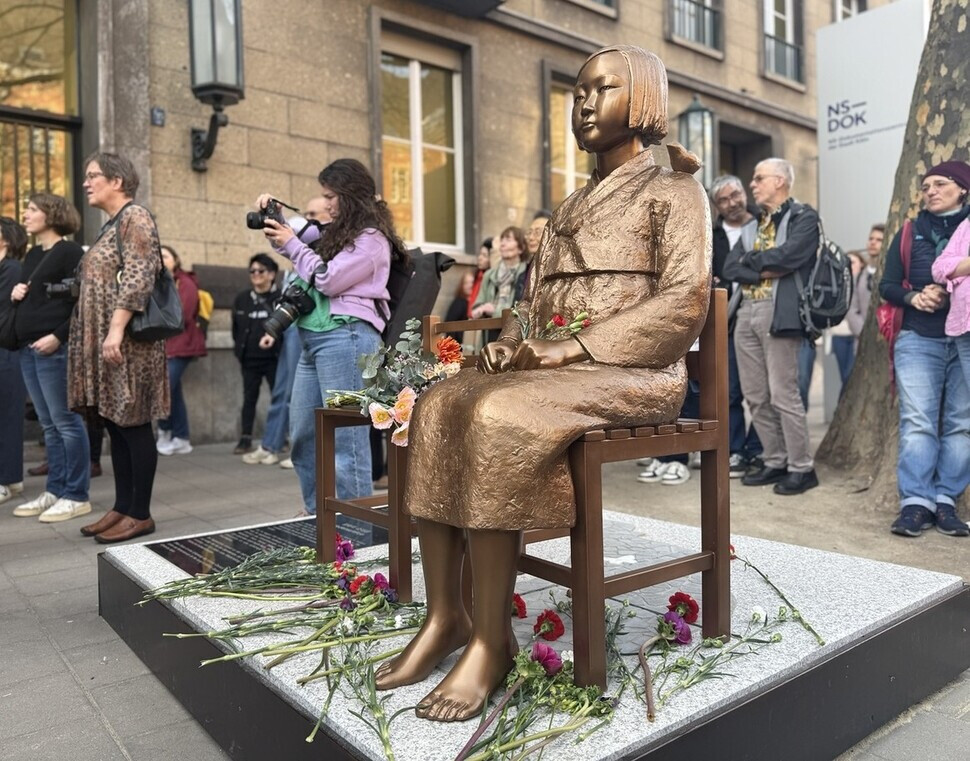
Berlin, Germany – A symbolic victory for advocates of historical remembrance and artistic expression has been secured in Berlin as the city's Administrative Court ruled on April 14th in favor of allowing the "Statue of Peace," a memorial dedicated to the victims of Japanese military sexual slavery during World War II, to remain installed until at least September 28th of this year. The court's decision temporarily overturns a demolition order issued by the Mitte District Office, the local authority with jurisdiction over the statue's location at the intersection of Bremer Straße and Birkenstraße.
The ruling, while interim, carries significant weight, particularly in its explicit articulation of the primacy of artistic freedom over the objections of the Japanese government. Installed on September 28, 2020, the Berlin Comfort Women Statue holds the distinction of being the first such memorial erected on public land in Europe, making it a potent symbol for activists seeking to raise awareness about the wartime atrocities.
Since its installation, the statue has been a point of contention, facing relentless lobbying efforts from Japan, which views such memorials as detrimental to bilateral relations and based on what it considers a disputed historical narrative. The Mitte District Office, seemingly bowing to this pressure, initially revoked the installation permit, leading to a protracted legal battle initiated by the Korea Verband (Korea Association), the German-based civic organization responsible for the statue's erection. The back-and-forth culminated in the district office's formal demolition order issued in September 2024, demanding the statue's removal by the end of October.
The recent court decision marks a crucial juncture in this ongoing saga. In its written judgment, the court emphasized the fundamental importance of upholding artistic freedom. It dismissed the district office's arguments that the statue's permanent installation circumvented necessary public competition procedures for artwork on public land and that its continued presence would unfairly preclude other artistic endeavors. The court found no clear public interest served by the statue's removal that would outweigh the infringement on artistic expression. Furthermore, it noted inconsistencies in the district's application of these procedural rules to other public artworks within its jurisdiction. The judgment explicitly stated the lack of evidence suggesting immediate interest from other artists to exhibit at the statue's location or any ongoing bidding process for permanent sculptural installations at the site.
Perhaps the most impactful aspect of the ruling, particularly for South Korea which has often been criticized for its passive stance on the comfort women issue on the international stage, is the court's unequivocal assertion that Japan's displeasure alone cannot justify the suppression of artistic expression. The district office had argued that the statue's continued presence contradicted Germany's official position that the comfort women issue was resolved by the 2015 agreement between South Korea and Japan, thereby hindering German diplomatic interests. They further contended that even if the statue were recognized as a symbol of universal women's rights, its specific placement in the Mitte district was unwarranted.
However, the court firmly rejected these arguments. It found no concrete evidence that the statue had demonstrably caused diplomatic friction or negatively impacted German-Japanese relations. Crucially, the court noted that Japan's objections were foreseeable from the outset when the statue's installation was initially approved. The judgment pointedly stated that the Japanese ambassador's numerous communications with the Mayor of the Mitte district merely illustrated Japan's concern, not any tangible negative diplomatic repercussions.
The Korea Verband has hailed the court's ruling as a significant, albeit interim, victory, viewing it as a vital step towards the permanent preservation of the memorial. The organization vowed to continue its legal and political efforts to ensure the statue's long-term future, though it had previously indicated a willingness to consider relocating the statue as part of a potential compromise during the legal proceedings. This openness suggests that the statue's current location might still be subject to future negotiations.
The Berlin Comfort Women Statue stands as a poignant reminder of the atrocities committed by the Japanese military and the enduring struggle for justice and historical accountability. The German court's decision to prioritize artistic freedom in this instance sets a notable precedent and underscores the importance of allowing open discourse and remembrance, even when it elicits discomfort from powerful nations. The coming months will be critical as the legal and political battles surrounding the statue's fate continue to unfold, with international attention likely to remain focused on this significant symbol of historical memory.
[Copyright (c) Global Economic Times. All Rights Reserved.]




























